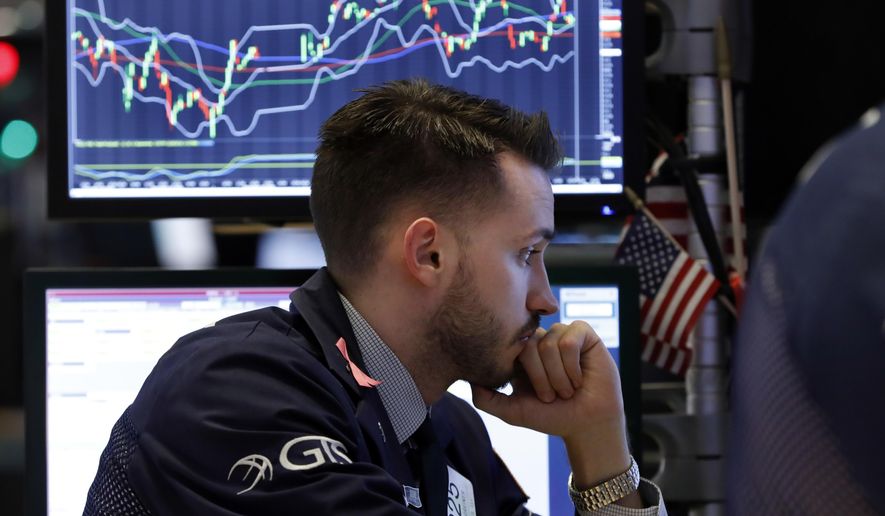OPINION:
Attacking President Trump’s policies for hurting Wall Street may help him with Main Street. Searching for any club with which to beat the president, the establishment media has suddenly seized on the stock market’s slide. This complete reversal of their earlier charge, that Mr. Trump’s policies were plutocracy personified, threatens Democrats’ favored line of attack for 2020.
The establishment media’s initial picture of Mr. Trump was anti-Main Street. Cast as the scion of wealth and the recipient of unearned advantage, he was a poster child of privilege who could not have been more out of touch with the common man.
This was the 2016 general election’s initial image and would have continued had Hillary Clinton’s own negatives not helped obscure it. It was also the narrative line during last year’s tax reform pursuit.
Throughout Mr. Trump’s short stint in politics, the establishment media have wanted to affix the pro-Wall Street label to Mr. Trump. That is, until the stock market’s recent vertigo-inducing swoons. Suddenly, Mr. Trump and his policies are Wall Street’s worst enemies.
Hypocrisy and the establishment media are hardly new acquaintances. Though even by their own standards, this tryst has been a speedy one. The Wall Street they despised for causing the financial crisis and not fueling an Obama recovery is now their cause for concern, as though all were moonlighting for CNBC.
There is no mystery why the establishment media came to care about the Wall Street they loathe: The 2020 election, like virtually all U.S. elections, hinges on the economy. They welcome anything offering a negative economic story — and all the better if it sets the stage for a broader downturn.
Just as there is no mystery in the establishment media’s recent stock market fixation, there is no little necessity either: They do not want attention focused on the broader picture. Main Street’s economic indicators have been soaring for the last two years. Unemployment is below low, real wages are growing, people are re-entering the workforce and the economy is booming.
The policies to which the stock market shock would be most reasonably be ascribed present another necessity. The most likely of these are trade-related — particularly the uncertainty arising from the administration’s China and NAFTA strategies. The establishment media’s problem with both is that they would be hard-pressed to point to politically acceptable alternatives.
China’s trade practices have been nothing short of predatory for some time. Hardly this administration’s verdict alone, it is shared throughout Congress and the West. Other than the Chinese and those benefiting from China’s policies, there are no defenders. So condemning the administration here puts critics in the quandary of explaining what they would do differently — and what would not produce the same results that brought America and the West to this juncture.
In regards to NAFTA, recall that Mrs. Clinton and Sen. Bernie Sanders both renounced it. Barack Obama did the same in 2008. President Trump has merely taken the action that Democrats have claimed to espouse.
There is a twofold threat from the establishment media’s storyline of Mr. Trump’s policies being anti-Wall Street. First, hypocrisy undermines credibility, thereby reducing their ability to negatively define Mr. Trump in general. Second, by associating him with being anti-Wall Street, they particularly undercut their ability to cast him as anti-Main Street.
The adage that “the enemy of my enemy is my friend” has certainly applied to Main Street’s view of Wall Street. Egged on by the establishment media’s blaming of Wall Street for the financial crisis, Main Street has felt it was left holding the bag while the financiers filled it. In Main Street’s mind: Wall Street enriched themselves while causing the crisis, they were then bailed out and ever since have enjoyed a recovery that has largely skipped the rest of America.
Main Street is hardly inclined to cry for Wall Street now — especially as the rest of America finally rebounds. Linking Mr. Trump to policies of which Main Street largely approves and which simultaneously unnerve Wall Street is hardly a PR problem for the administration. Rather it could enhance his standing with Main Street, while limiting the establishment media’s ability to link him to Wall Street in two years.
This could prove even more limiting — and costly — to 2020 Democrats. Undoubtedly, the Democratic contest is shaping up as one to out-populist Mr. Trump. In 2016, Mr. Sanders proved the left is where Democrats’ energy lies, 2018 confirmed it, and 2020 will nominate it. However, the establishment media’s linking of Mr. Trump to anti-Wall Street policies now could serve to undermine this strategy later. By confusing their narrative of where Mr. Trump stands regarding Wall Street, the establishment media may well confuse voters, too.
Any politician having to choose between Wall Street and Main Street will take the latter. As Willie Sutton once replied about why he chose to rob banks — “that’s where the money is” — Main Street is where the votes are. It is why Democrats have made that choice for 2020. It is also why the establishment media’s concern for Wall Street’s drops is more than hypocrisy and irony for Mr. Trump, it is opportunity.
• J.T. Young served in the Office of Management and Budget and the Treasury Department.




Please read our comment policy before commenting.